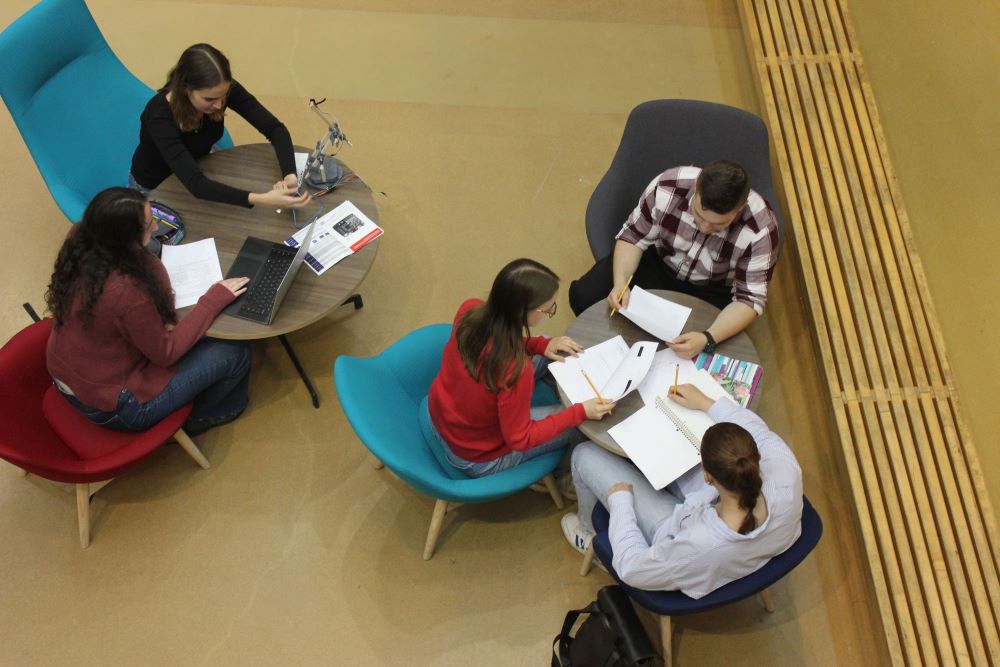
The grand challenges facing humanity are complex, multidisciplinary, and global. Developing sustainable energy sources, addressing climate change, ensuring water and food security, developing sustainable cities, and supporting human health will require a deep understanding of both technology and society.
At Smith Engineering, students are developing the skills needed to tackle these challenges, including analytical and creative thinking, curiosity, resilience, technological literacy, empathy, and leadership.
Experiential learning is a powerful way to develop these skills, pairing traditional classroom learning with real-world problem-solving experiences.
Below, dive into three stories about how experiential learning helps engineering students evoke positive change in the world.
Student-industry collaboration in a capstone course
Professor David Strong is a pioneer in developing holistic and experiential curricula. He led the development of a two-course elective multidisciplinary design and innovation stream, culminating in the capstone APSC 480 Multidisciplinary Design Project.
APSC 480 is a two-term experience that provides students with the challenge of an immersive real-world engineering project in partnership with an industry client. The course provides an invaluable learning opportunity to students from a range of disciplinary backgrounds by developing design, professional, technical, project management, and critical thinking skills that support a broad career path.
“We teach [students] things like problem solving and problem definition and creativity,” says Strong. “We integrate project management, cost estimation, and regulatory and safety issues because those are all the things that I required as a practicing engineer.”
Students work directly with industry representatives and provide tangible, lasting contributions, such as a recent partnership with industry partner MEDATech on a thermal management system.
David Strong’s real-world, industry-relevant teaching is an important foundation for helping students create impact. He recently received Canadian Engineering Education Association’s Lifetime Achievement Educator Award for his work in this area.
Multidisciplinary student team addresses water quality concerns in Indigenous community
Water quality concerns in the Tyendinaga Mohawk Territory—the Indigenous community west of Kingston—are the focus of a multidisciplinary student team. The Queen’s Genetically Engineered Machine Team (QGEM) has been working with Chief Donald Maracle and the Queen’s Office of Indigenous Initiatives to develop a device that detects and filters water pathogens.
QGEM is an undergraduate design team offering students a chance to “learn beyond the textbook,” that uses innovations in the fast-evolving field of synthetic biology to tackle real-world problems related to medicine, industry, the environment, and more. Planning and executing a cutting-edge project each summer gives QGEM students a unique opportunity to develop problem solving, teamwork, leadership, and lab skills beyond what is available in a traditional course.
“We’re exposed to client-based projects from first year,” says outgoing team director Victor Di Donato. “Students in Life Sciences focus on the results in a lab whereas in Engineering we think of external factors that can alter a project, and how it changes outside a controlled environment.”
Apart from the water pathogen filtration device, these award-winning students have produced other fascinating technologies such as biosensor monitors used to treat chronic kidney failure and a system that tests ticks for Lyme disease.
Students driving clean energy forward
Led and founded by engineering students, Queen’s Relectric’s mission revolves around clean energy—namely the conversion of gas-powered engines to electric ones.
Undergraduate engineering students from several fields (e.g., computer science, mechatronics, material science, electrical) get hands-on experience by planning and testing the conversion of a real vehicle. The research and development in this process provides valuable insight for research and industry application.
Reelectric Founder Mira Teoli is now in her second year of graduate studies in mechanical engineering. Along with the intense, collaborative, and rewarding hands-on experience, she also credits the program’s success to supportive alumni.
“We have a close relationship with one of the alumni classes. They were integral to getting us started with funding,” explains Teoli. “We meet with Sc’74 once or twice a year to update them. I enjoyed connecting with engineers that have a lifetime of industry experience and having their feedback. They wanted to get involved in the early stages and watch the team grow.”
Education innovation – part of the Smith Engineering strategic plan
The next generation of students are deeply aware of their potential to create impact. Experiential learning at Queen’s University is fostering globally minded problem solvers who are already building better futures across all sectors of society.
This dedication to experiential learning is part of the Faculty of Engineering’s Strategic Plan, Driving Curiosity Forward. You can learn more about the plan and its focus areas here.